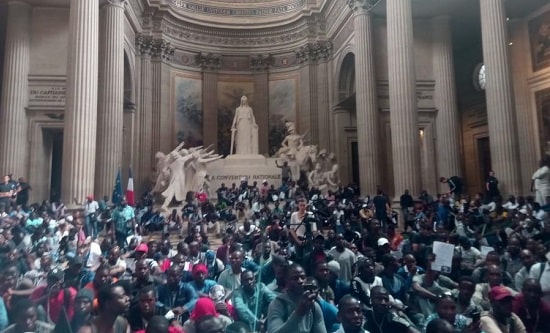
On 19 May, around 500 undocumented migrants occupied Paris Charles de Gaulle Airport – the largest international airport in France and the second-busiest airport in Europe. They were there to protest against Air France’s involvement in deportations and the airport’s violence against those being deported, demanding an end to their ‘material, financial, political and logistical participation’, as well as an end to the horrendous treatment of undocumented migrants by the French state. There were two people they wanted to speak to in particular: the CEO of Air France, and Edouard Philippe, the Prime Minister of France. They remained there for roughly two hours, facing violence and tear gas by the French police.
This did not deter them as months later on 12 July the Panthéon, a Parisian tourist attraction, was taken over by 500 protesters at midday. The protesters occupied the mausoleum, proclaiming that ‘France continues slavery in another form!’, and pointing out that while there are 200,000 empty homes in Paris, ‘we sleep under the inter-changes of the ring road’. The protesters called themselves the gilets noirs (‘black vests’), and they are a group of undocumented migrants demanding papers, accommodation, and human rights for all. These occupations followed months of organisation and effort, through smaller protests and reaching out to the participants’ communities.
The gilets noirs are responding to systemic racism both old and new. On 1 August 2018, the Immigration and Asylum Act was passed into law, doubling the legal detention period of migrants from 45 to 90 days and cutting the time that asylum seekers are able to apply for asylum from 120 to 90 days. Additionally, refugee status can now be withdrawn from anyone who has previously committed a crime in the European Union or in a country that is deemed ‘democratic’ by France; migrants are no longer allowed 30 days to prepare for deportation if they refuse to give their fingerprints or get their photograph taken; and there has been no attempt to prohibit the detention of accompanied children, despite critical recommendations by human rights organisations. The purpose of these measures is to make it easier for asylum seekers to be detained and deported, and more difficult for citizenship applications to go through in time and be accepted.
France holds more migrants in detention centres than any other European country, with 45,851 people detained in 2018, and 46,800 detained in 2017. For those not given asylum, access to employment is precarious and exploitative, and it is difficult to find accommodation: in Paris alone, roughly 2,000 undocumented migrants live on the streets, with many people living in makeshift tent camps, without access to clean drinking water and basic amenities.
In Calais – home of the infamous shanty town-esque camp known as the ‘Jungle’– 972 reports of human rights abuses against migrants by the police were recorded by a group of NGOs (L’Auberge des Migrants, Refugee Info Bus, Utopia56 and Legal Shelter) in 2018. This involved: indiscriminately shooting tear gas into crowds, leading to a 16-year-old Eritrean boy losing an eye, his sense of smell and his hearing; police beatings with both fists and batons; rubber bullets being fired into crowds at close range; and people being kept from their possessions and denied medication.
Meanwhile, mass protests against falling living standards in the form of the gilets jaunes – the ‘yellow vests’ – continue. As we wrote in ‘Gilets jaunes: a contradictory movement’ on our website ,* the movement contains various political forces, ‘from racists protesting the presence of Muslims in Europe to anti-racist students fighting against rises in tuition fees for migrants’. The gilets noirs represent a distinctly anti-imperialist trend within this contradictory movement. In a press release after their protest at Charles de Gaulle, the gilets noirs said: ‘We are not simply fighting for documentation, but against a system that makes us undocumented immigrants.’ The gilets noirs have stated that major Parisian business district La Défense ‘represent[s] the heart of imperialism’. They stand against French intervention in Africa, and they stress international solidarity against the common enemy of French imperialism.
Links of solidarity have begun to be built between progressive sections of the gilets jaunes and the gilets noirs. Members of the two movements united in a rail strike against the exploitation of workers hired by Geodis in Genevilliers, a Parisian commune. On 21 July, a meeting in Beaumont-sur-Oise was held preceding a march against police brutality, attended by members of both movements, who called for a ‘convergence of struggles’, and for solidarity against a shared enemy. The gilets noirs have also been working with La Chapelle Debout! (La Chapelle Stand Up!), an anti-racist group centred in Paris that has been active for over five years, fighting deportations and standing against the racism of the French state. Socialists must stand in solidarity with the gilets noirs and support the alliance between them and the progressive currents in the gilets jaunes – that is the way to true working class unity.
Liam Ghalem
* ‘Gilets Jaunes’: a contradictory movement
Fight Racism! Fight Imperialism! No 272, October/November 2019




